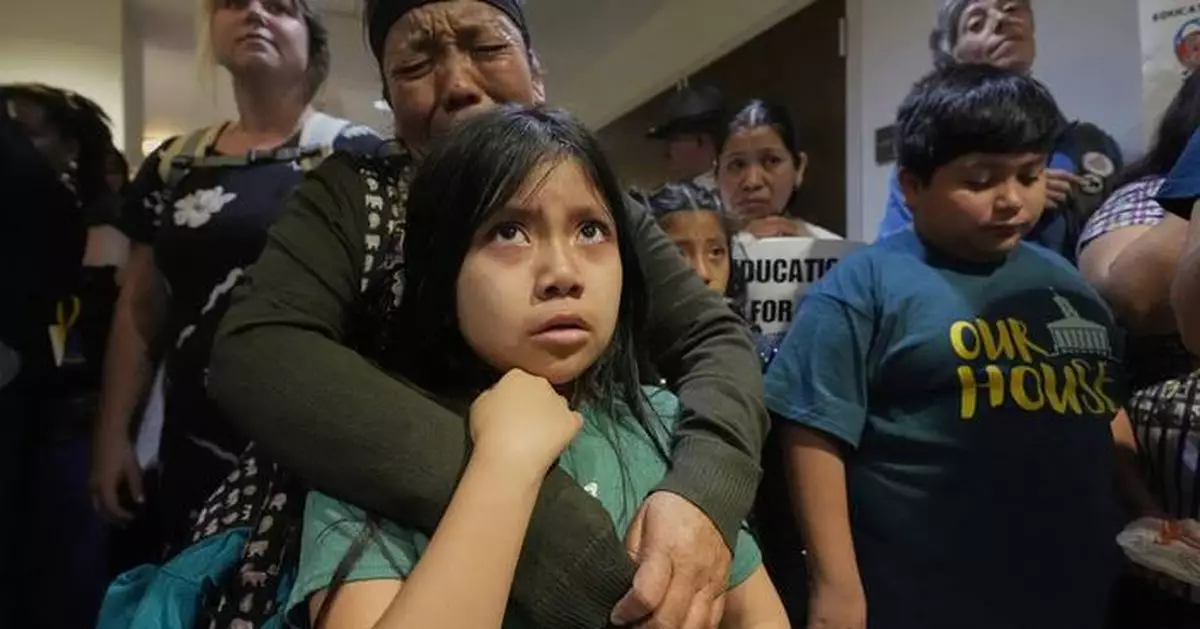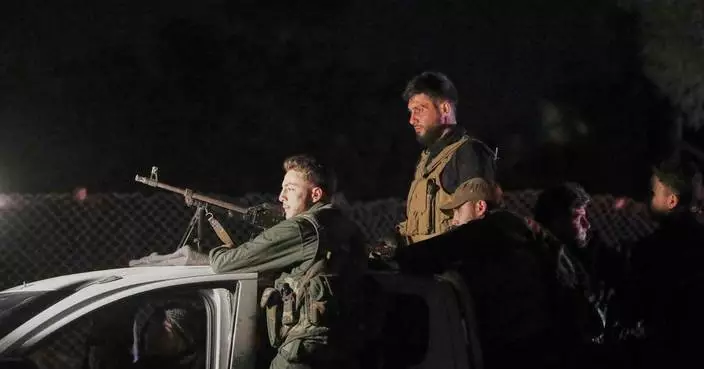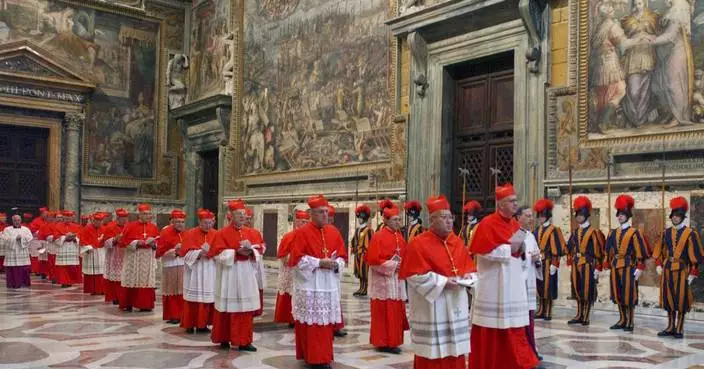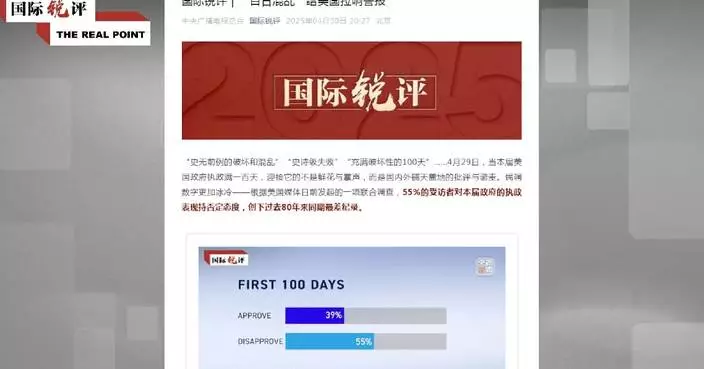NASHVILLE, Tenn. (AP) — Republican lawmakers in Tennessee have paused a bill meant to challenge the constitutional right for children to attend public schools regardless of their immigration status. Instead, with time waning in the legislative session, they are asking U.S. officials for guidance on whether the bill would jeopardize federal education funding.
The direction announced Monday by House Majority Leader William Lamberth, the bill sponsor, diminishes the chances for the bill to pass this year as lawmakers prepare for a likely adjournment this week. The Tennessee Journal first reported on Lamberth's decision.
Hundreds of children have packed the Tennessee Capitol this year to oppose the bill that takes aim at the protection established by the landmark 1982 U.S. Supreme Court decision in Plyler v. Doe. That decades-old decision struck down a Texas law that sought to deny enrollment to any student not “legally admitted” into the country.
The Republican-controlled Tennessee Senate has already passed a version of the bill, which would require proof of legal residence to enroll in public K-12 public schools and would give school districts the option — but not the requirement — of turning away students who fail to provide proper documentation or to charge them tuition. The House version, which remains idle in a subcommittee, differs by letting public schools check immigration status, rather than requiring it.
Lamberth noted that Tennessee receives approximately $1.1 billion in federal education money annually.
“We fully trust the Trump Administration will not withhold federal dollars from our schools due to the passage of House Bill 793/Senate Bill 836,” Lamberth said. “However, out of an abundance of caution, we want to be exceptionally careful before we move forward to ensure no federal taxpayer dollars are at risk.”
A growing number of conservative leaders are pushing states to overturn Plyler v. Doe — including the conservative think tank The Heritage Foundation. Tennessee’s Republican lawmakers were among the most aggressive in pursuing the idea that directly contradicts Supreme Court precedent.
Proponents of the bill have largely downplayed denying children the right to education, but instead have focused on the fiscal impact states are facing in educating children residing in the U.S. illegally. However, it's unclear whether the bill would result in any savings.
In opposition, student have broken down in tears in front of legislative committees, distraught over their classmates being removed from their school and worries over who might be next. Some advocates applauded Monday's news but cautioned the bill isn't dead until lawmakers gavel out for the year.
“What’s undeniable is this: lawmakers have been forced to acknowledge the overwhelming, bipartisan opposition from across the state to targeting children and denying them an education,” said Lisa Sherman Luna, executive director of the Tennessee Immigrant & Refugee Rights Coalition.
Lawmakers and other conservative supporters repeatedly point to the 5-4 vote that determined Plyler in 1982, arguing that the narrow margin means there's a better chance the precedent could be overturned by the current Supreme Court. Notably, the court has overturned the right to abortion.
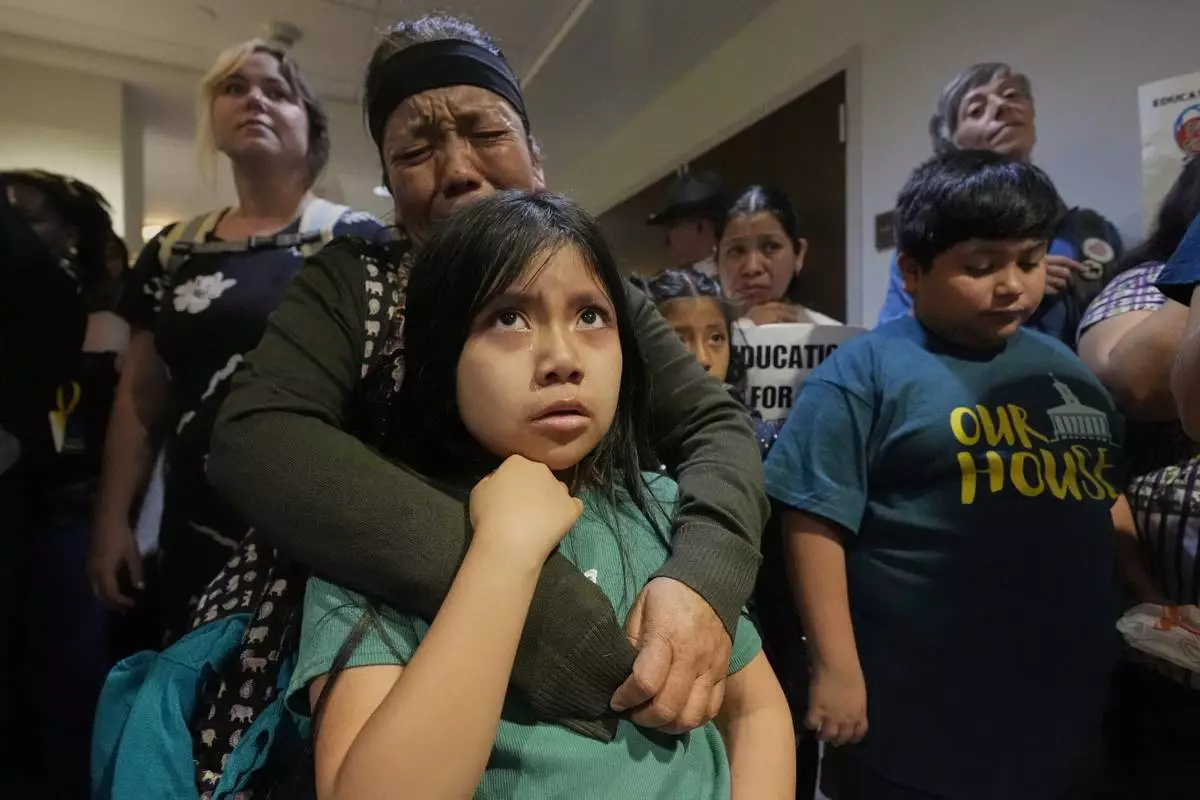
FILE - A woman embraces her child outside a House hearing room during protests against a bill that would allow public and charter schools to deny immigrant students from enrolling for classes in Nashville, Tenn., March 11, 2025. (AP Photo/George Walker IV, File)
WASHINGTON (AP) — Secretary of State Marco Rubio has been thrown into two top national security jobs at once as President Donald Trump presses forward with his top-to-bottom revamp of U.S. foreign policy, upending not only longstanding policies that the former Florida senator once supported but also the configuration of the executive branch.
Trump's appointment of Rubio to temporarily replace Mike Waltz as national security adviser is the first major leadership shake-up of the nascent administration, but Waltz's removal had been rumored for weeks — ever since he created a Signal group chat and accidentally added a journalist to the conversation where top national security officials shared sensitive military plans.
So, just over 100 days into his tenure as America’s top diplomat, Rubio now becomes just the second person to hold both positions. He follows only the late Henry Kissinger, who served as both secretary of state and national security adviser for two years under Presidents Richard Nixon and Gerald Ford in the 1970s.
Rubio — a one-time Trump rival and hawkish conservative who was derided by the president as “Little Marco” during the 2016 presidential campaign — has proven adept at aligning himself with Trump’s “America First” foreign policy positions. Rubio has largely eschewed his staunch advocacy of providing foreign aid and promoting democracy overseas since taking over the State Department, repeating a refrain that every policy or program should make America safer, stronger or more prosperous.
Since being confirmed in a 99-0 Senate floor vote, Rubio has presided over a radical reorganization of the State Department. That includes the dismantling of the U.S. Agency for International Development and plans to cut U.S. jobs by 15% while closing or consolidating more than 100 bureaus worldwide. He has also begun a major cull of the visa system, revoking hundreds, if not thousands, of visas issued to foreign students.
He has overseen the negotiation of agreements to send immigrants accused of crimes to third countries, most notably to El Salvador, in cases that are now being challenged in federal courts.
“Marco Rubio, unbelievable," Trump said Thursday before announcing on social media that Waltz would be nominated as ambassador to the United Nations and Rubio would take over as national security adviser in the interim. "When I have a problem, I call up Marco, he gets it solved.”
That's a far cry from 2016, when Rubio and Trump were competing for the GOP presidential nomination and Rubio warned that Trump was a threat. After Trump won, the relationship remained contentious, but eight years later, Rubio was an enthusiastic Trump supporter who worked his Florida bona fides to get into the president's inner circle.
Yet, even after Rubio was nominated to the top diplomatic job, doubts remained. Many pundits suggested he would last only a short time in office before Trump dismissed him in the same way he did his first-term secretary of state, Rex Tillerson, who was fired by tweet in 2018 just 18 months into the job.
Yet Rubio has been resilient. And as of Thursday, he oversees both the State Department and the National Security Council, which is responsible for coordinating all executive branch foreign policy functions, ranging from diplomatic to military and intelligence operations.
Thomas Wright, an NSC official during the Biden administration who is now a senior fellow at the Brookings Institution, said the national security adviser post alone is “more than a full-time job.”
“It is just very hard to comprehend the idea that you can do this job sort of part time,” Wright said.
He said he watched national security adviser Jake Sullivan and his deputy work 14-15 hour days, six to seven days a week: “I think they felt that they had to do that to do the job properly.”
Appearing Thursday night on Fox News Channel’s “Hannity," Rubio was not asked to weigh in on the president’s decision to tap him as national security adviser but did joke that he was barred from adding pope to his list of many jobs because he is married.
But as he marked the first 100 days of Trump's latest term, Rubio applauded the president for his vision.
“I am honored by the trust President Trump placed in me and I am proud of the work the Department of State has done over the past hundred days to implement his agenda and put the American people first,” he wrote Wednesday in a State Department Substack post.
One of Rubio’s former Florida statehouse colleagues, Dan Gelber, a Democrat, said of Rubio's increasing responsibilities that "Marco is probably, to a certain extent, one of the more reliable Cabinet officers, if not the most reliable."
“And I can only believe those qualities are even more vital to his current confluence of positions and growing portfolio,” Gelber said. "He’s not a chaos guy, and I’ve always sort of wondered how he’s going to do in an administration where there seems to be so much chaos. And maybe that’s why he’s getting all these positions.”
Rubio's dual-hatted role comes on top of him serving as acting administrator of the largely shut down USAID and as acting head of the National Archives. It puts him in a similar position to that of Trump's longtime personal friend and golfing buddy Steve Witkoff.
As a special envoy, Witkoff is the lead U.S. negotiator in the Iran nuclear talks and in administration peace efforts for the Israel-Hamas war and the Ukraine-Russia war.
In many ways, Rubio and Witkoff are following in the footsteps of Trump’s son-in-law Jared Kushner, who had multiple roles in the first administration, ranging from the Middle East to Latin America and immigration.
State Department officials appeared taken aback by Trump's appointment of Rubio as acting national security adviser. Spokeswoman Tammy Bruce said at a briefing Thursday that she learned the news from a journalist who asked her a question about Trump's post minutes after it appeared on social media.
Officials, however, have noted that Rubio in recent weeks has spent an increasingly large amount of time at the White House away from his posh seventh-floor State Department office in what is known as “Mahogany Row,” a corridor known for its wood paneling.
At the same time, these officials, who spoke on condition of anonymity to discuss the personnel shift, said they did not expect Rubio's duties as secretary of state to change significantly. He still plans to travel on diplomatic missions abroad and likely will delegate at least some of the NSC management to others, they said.
Amiri reported from the United Nations.
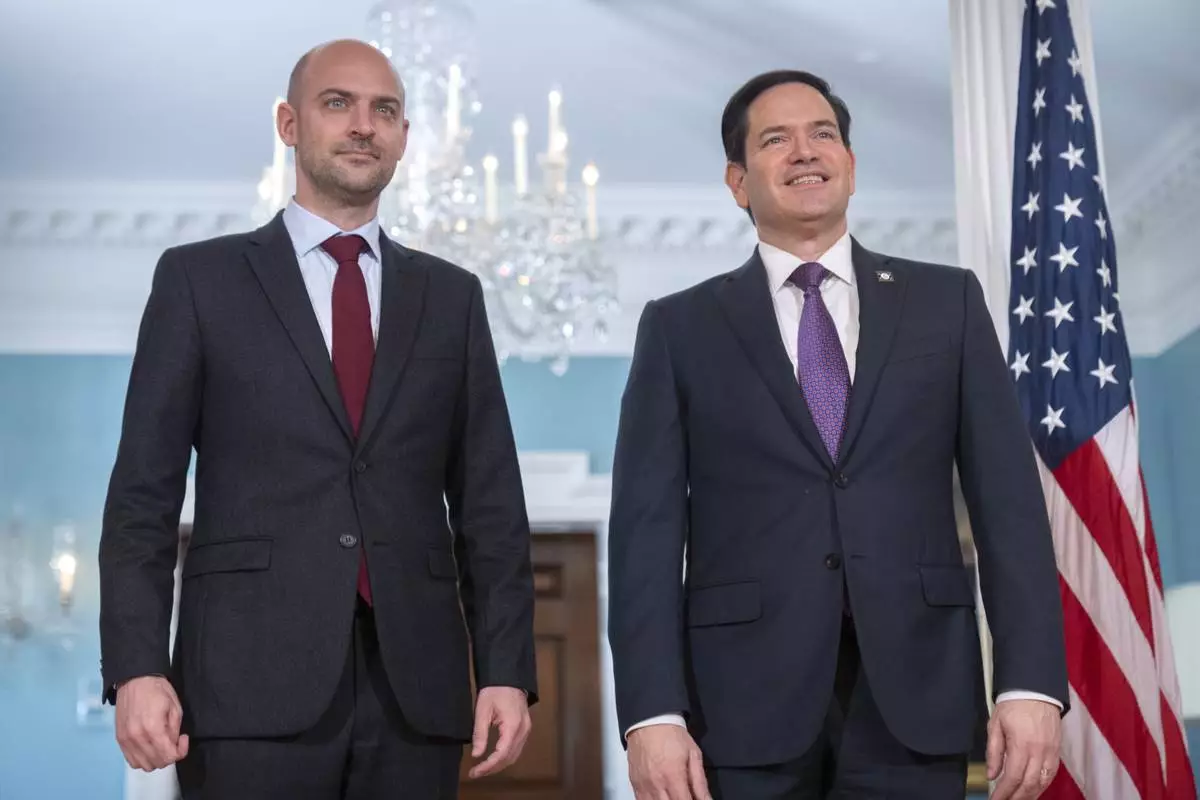
Secretary of State Marco Rubio, right, stands with French Foreign Minister Jean-Noel Barrot at the State Department, Thursday, May 1, 2025, in Washington. (AP Photo/Mark Schiefelbein)
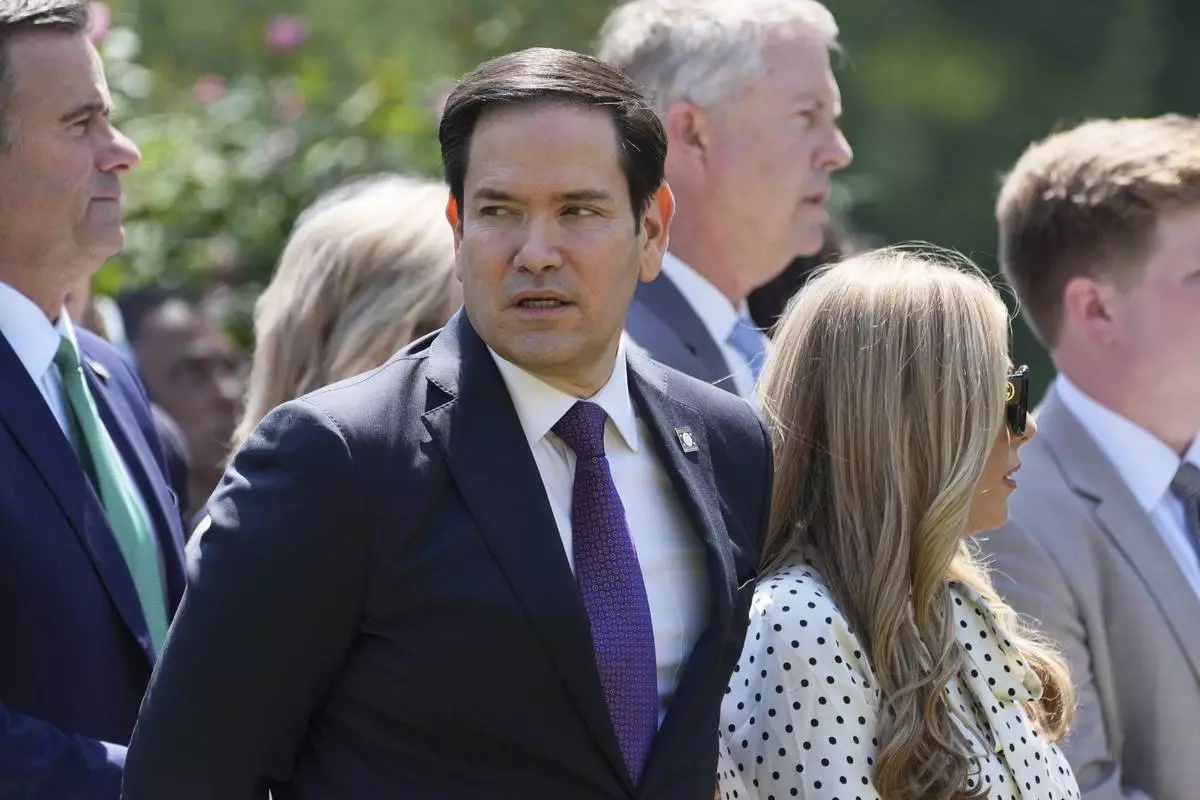
Secretary of State Marco Rubio attends a National Day of Prayer event in the Rose Garden of the White House, Thursday, May 1, 2025, in Washington. (AP Photo/Evan Vucci)
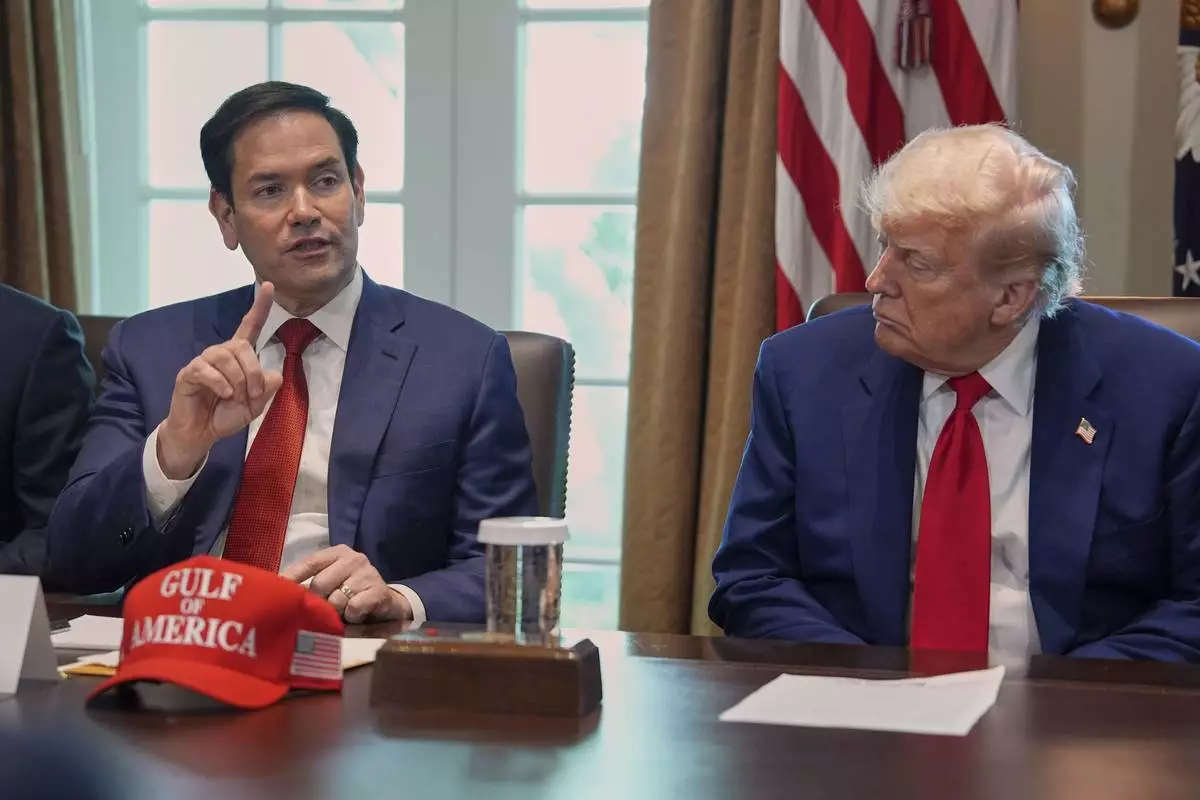
Secretary of State Marco Rubio speaks during a cabinet meeting at the White House, Wednesday, April 30, 2025, in Washington, as President Donald Trump look on. (AP Photo/Evan Vucci)



